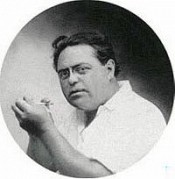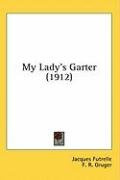Futrelle Jacques

Jacques Heath Futrelle (April 9, 1875 - April 15, 1912) was an American journalist and mystery writer. He is best known for writing short detective stories featuring the "Thinking Machine", Professor Augustus S. F. X. Van Dusen. Futrelle, who was born in Pike County, Georgia, worked for the Atlanta Journal, where he began their sports section; the New York Herald; the Boston Post; and the Boston American, where, in 1905, his Thinking Machine character first appeared in a serialized version of "The Problem of Cell 13". In 1895, he married fellow writer Lily May Peel, with whom he had two children, Virginia and Jacques "John" Jr. Futrelle left the Boston American in 1906 to focus his attention on writing novels. He had a house built in Scituate, Massachusetts, which he called "Stepping Stones", and spent most of his time there until his death in 1912. Returning from Europe aboard the RMS Titanic, Futrelle, a first-cabin passenger, refused to board a lifeboat insisting his wife board instead. His wife remembered the last she saw of him, he was smoking a cigarette with John J. Astor. He perished in the Atlantic. Futrelle's last work, "My Lady's Garter", was published posthumously later in 1912. His wife inscribed in the book, "To the heroes of the Titanic, I dedicate this my husband's book" under a photo of her late husband. On 29 July 1912 his mother, Linnie Futrelle, died in her Georgia home; her death was attributed to grief over her son's death. Futrelle is used as the protagonist in The Titanic Murders, a novel about two murders aboard the Titanic, by Max Allan Collins.
do you like this author?
What readers are saying
What do you think? Write your own comment on this book!
write a commentWhat readers are saying
What do you think? Write your own comment on this author!
write a commentBook list

my ladys garter
Series:
Unknown
Year:
Unknown
Raiting:
5/5
My Ladys Garter THE LAST NOVEL By JACQUES FUTRELLE I WIT H FOUR ILLUSTRATIONS - ONCE upon a time, nearly six hundred years ago-about the year 1344 to be mere explicit-His Gracious Majesty, King Edward 111, guest of honor at the grand annual ball of the Larry L. Plantagenet Association, paused while dancing with the beautiful Countess of Salisbury, and, stoop- ing, picked up from the floor-a ladys garter It was a ribbon of dark blue, edged with yellow-a slender, shapely thing with buckle and pendant cunningly wrought of gold. The countess gasped, blushed, grabbed hysterically at her left knee, then giggled Even beautiful women giggle A smile ran around the ballroom the smile became a titter. Honi soit pui mal y pense His Majesty reproved sharply. Now one may translate that a dozen ways Evil to him who evil thinks, or Shame be upon him who thinks ill of it. Anyway, those gay young blades who had been boning their French with the idea of assisting Ed- ward I11 to the throne of France, discovered suddenly that there was nothing amusing in the incident and ribald laughter died on their lips. For, be it understood, in those days it wasnt healthy to laugh unless the king laughed first. Bending gravely, His Majesty placed the garter around his own leg, the left, just below the knee, and the dance went on to the .end. Then My-my garter, please stammered the countess in charming confusion. I shall return a pair of them, my dear Countess-a pair done in gold, His Majesty told her gallantly. Perchance there may be a jewel or so in the royal strong box with which to adorn them. You will honor me by accepting them. The Countess curtseyed to the floor. So, romantically enough, was born Brit- ains highest order of chivalry, the Order of the Garter. Its insignia is a slender ribbon of dark blue, edged with yellow, and overlaid with shields of gold, upon each of which is the motto Honi soit pi mat y enselH Its pendant represents St. George, armored, - . MY LADYS GARTER I I on a white horse, poking a large spear down the vermilion throat of a green dragon with a barbed tail. Ten thousand men have died for it. Just what Queen Philippa, Edwards con- sort, had to say about it when her husband appeared before her wearing another womans garter, or how the Countess of Salisbury managed for the remainder of the evening, doesnt appear. These, together with other interesting details, are lost in the mists of antiquity. For many years a ladys garter lay among the precious relics tucked away in an obscure corner of the British Museum. It differed from the widely known insignia of the Order of the Garter only in its apparent extreme age,-and in the fact that diamonds and rubies were set alternately in the six shields of gold overlaying the ribbon. This was one of the two original garters given to the Coun- tess of Salisbury by His Majesty, Edward 111. Something like a year since the garter vanished. Obviously, it had been stolen. PART I1 THE ADVENTURES OF THE HAWK CHAPTER I L OVE is the one immutable quality we poor humans possess. It is unchanging as the whiteness of snow, or the redness of roses, or the blush of the desert dawn. Its object may alter-alas, how often it doesbut love itself is an essential. That was as true ten thousand zons ago as it is now, and as it will be ten thousand zons hence. So, perforce, the delver into emotions must be trite in his expositions. Twas only a whim of the somber goddess who spins the threads of our lives that saved from triteness the affair I am about to recount... --This text refers to the Paperback edition.
Show more
add to favoritesadd In favorites

Elusive Isabel
Series:
Unknown
Year:
Unknown
Raiting:
3/5
With Illustrations by Alonzo Kimball --This text refers to an alternate Paperback edition.
Show more
add to favoritesadd In favorites

The Diamond Master
Series:
Unknown
Year:
Unknown
Raiting:
0.5/5
Purchase of this book includes free trial access to www.million-books.com where you can read more than a million books for free. This is an OCR edition with typos. Excerpt from book: "Sid down, Laadham, sid down," he invited explosively. "I haf yust send der vaiter to der delephone to ask" There was a restrained note of excitement in the German's voice, but at the moment it was utterly lost upon Mr. Latham. "Schultze, you've probably imported more diamonds in the last ten years than any other half-dozen men in the United States," he interrupted. "I have something here I want you to see. Perhaps, at some time, it may have passed through your hands." He placed the glazed box on the table. For an instant the German stared at it with amazed eyes, then one fat hand darted toward it, and he spilled the diamond out on the napkin in his plate. Then he sat gazing as if fascinated by the lambent, darting flashes deep from the blue-white heart. "Mem Gott, Laadham!" he exclaimed, and with fingers which shook a little he lifted the stone and squinted through it toward the light, with critical eyes. Mr. Latham was leaning forward on the table, waiting, watching, listening. "Well?" he queried impatiently, at last. "Laadham, id is der miracle!" Mr. Schultze explained solemnly, with his characteristic, whimsical philosophy. "I haf der duph'gade of id, Laadhamder dwin, der liddle brudder. Zee here!" From an inner pocket he produced a glazed white box, identical with that which Mr. Latham had just set down, then carefully laid the cover aside. "Look, Laadham, look!" Mr. Latham lookedand gasped! Here was the counterpart of the mysterious diamond which still lay in Mr. Schultze's outstretched palm. "Dey are dwins, Laadham," remarked the German quaintly, finally. "Id came by der mail in dis morningyust like das, wrapped in paper, but mit no marks, no name, no nod- ings. Id yust came!" With his right hand Mr. Latham lifted the duplicate diamond f...
Show more
add to favoritesadd In favorites
What readers are saying
What do you think? Write your own comment on this author!
write a commentGenre
- Professional & Technical / Engineering / Electrical & Electronics / Electromagnetic Theory
- Books / Burnett, Frances Hodgson,1849-1924
- Mystery & Thrillers
- Nonfiction / Education / Education Theory / History
- Reference / Atlases & Maps / World
- Books / Echegaray, José,1832-1916 / Translations into English
if you like Futrelle Jacques try:
readers also enjoyed
What readers are saying
What do you think? Write your own comment on this author!
write a commentGenre
- Professional & Technical / Engineering / Electrical & Electronics / Electromagnetic Theory
- Books / Burnett, Frances Hodgson,1849-1924
- Mystery & Thrillers
- Nonfiction / Education / Education Theory / History
- Reference / Atlases & Maps / World
- Books / Echegaray, José,1832-1916 / Translations into English
if you like Futrelle Jacques try:
readers also enjoyed
Do you want to read a book that interests you? It’s EASY!
Create an account and send a request for reading to other users on the Webpage of the book!



